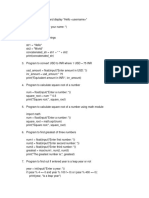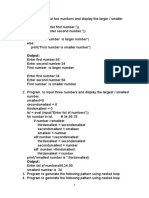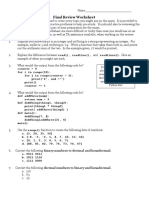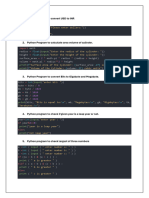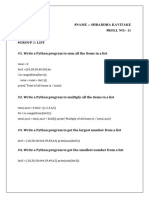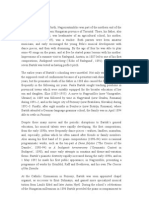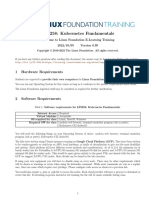0 ratings0% found this document useful (0 votes)
8 views20 simple Python code
Uploaded by
vishalmagar6Copyright
© © All Rights Reserved
We take content rights seriously. If you suspect this is your content, claim it here.
Available Formats
Download as DOCX, PDF, TXT or read online on Scribd
0 ratings0% found this document useful (0 votes)
8 views20 simple Python code
Uploaded by
vishalmagar6Copyright
© © All Rights Reserved
We take content rights seriously. If you suspect this is your content, claim it here.
Available Formats
Download as DOCX, PDF, TXT or read online on Scribd
You are on page 1/ 6
Here are the 20 simple Python code examples without using functions:
1. Print "Hello, World!"
print("Hello, World!")
2. Find the sum of two numbers
a=5
b=3
print(a + b)
3. Check if a number is even or odd
num = 10
if num % 2 == 0:
print("Even")
else:
print("Odd")
4. Find the largest of two numbers
a=5
b = 10
if a > b:
print(a)
else:
print(b)
5. Count the number of vowels in a string
s = "hello"
vowels = "aeiou"
count = 0
for char in s:
if char in vowels:
count += 1
print(count)
6. Find the factorial of a number
num = 5
fact = 1
for i in range(1, num+1):
fact *= i
print(fact)
7. Check if a number is prime
num = 11
is_prime = True
for i in range(2, num):
if num % i == 0:
is_prime = False
break
print(is_prime)
8. Reverse a string
s = "hello"
reversed_s = ""
for i in range(len(s)-1, -1, -1):
reversed_s += s[i]
print(reversed_s)
9. Find the Fibonacci sequence up to n terms
n=5
a, b = 0, 1
for _ in range(n):
print(a, end=" ")
a, b = b, a + b
10.Check if a string is a palindrome
s = "madam"
if s == s[::-1]:
print("Palindrome")
else:
print("Not Palindrome")
11.Find the length of a list
lst = [1, 2, 3, 4, 5]
count = 0
for item in lst:
count += 1
print(count)
12.Sort a list of numbers
lst = [5, 2, 9, 1]
for i in range(len(lst)):
for j in range(i + 1, len(lst)):
if lst[i] > lst[j]:
lst[i], lst[j] = lst[j], lst[i]
print(lst)
13.Merge two lists
list1 = [1, 2, 3]
list2 = [4, 5, 6]
merged_list = list1 + list2
print(merged_list)
14.Find the minimum and maximum of a list
lst = [5, 2, 9, 1]
min_val = lst[0]
max_val = lst[0]
for item in lst:
if item < min_val:
min_val = item
if item > max_val:
max_val = item
print(min_val, max_val)
15.Find the average of numbers in a list
lst = [1, 2, 3, 4, 5]
sum_lst = 0
for num in lst:
sum_lst += num
average = sum_lst / len(lst)
print(average)
16.Remove duplicates from a list
lst = [1, 2, 2, 3, 4, 4]
unique_lst = []
for item in lst:
if item not in unique_lst:
unique_lst.append(item)
print(unique_lst)
17.Create a dictionary and access values
my_dict = {"name": "Alice", "age": 25}
print(my_dict["name"])
18.Check if a key exists in a dictionary
my_dict = {"name": "Alice", "age": 25}
if "name" in my_dict:
print(True)
else:
print(False)
19.Find the intersection of two sets
set1 = {1, 2, 3}
set2 = {2, 3, 4}
intersection = set()
for item in set1:
if item in set2:
intersection.add(item)
print(intersection)
20.Calculate the power of a number
base = 2
exp = 3
result = 1
for _ in range(exp):
result *= base
print(result)
You might also like
- file_2023895707_1741228495_Practice Question 7 DNo ratings yetfile_2023895707_1741228495_Practice Question 7 D6 pages
- Practical Assignment Xi SC (CS) - 2022-23No ratings yetPractical Assignment Xi SC (CS) - 2022-238 pages
- Practical File: Program 1: Program To Enter Two Numbers and Print The Arithmetic Operations Like +,-,, /, // and %No ratings yetPractical File: Program 1: Program To Enter Two Numbers and Print The Arithmetic Operations Like +,-,, /, // and %36 pages
- K L University Department of Ece Computer Networks Lab Manual (15Cs2208) Python Basic ProgramsNo ratings yetK L University Department of Ece Computer Networks Lab Manual (15Cs2208) Python Basic Programs6 pages
- Lab Manual_ Week 1 - Programming for Artificial IntelligenceNo ratings yetLab Manual_ Week 1 - Programming for Artificial Intelligence8 pages
- Python Lab Programs 1. To Write A Python Program To Find GCD of Two NumbersNo ratings yetPython Lab Programs 1. To Write A Python Program To Find GCD of Two Numbers12 pages
- 20 Python Coding Questions and Answers For ProgrammingNo ratings yet20 Python Coding Questions and Answers For Programming10 pages
- Enter Your Name Nishigandha Enter Your Age 22 Nishigandha You Will Turn 100 Years Old in 2098100% (1)Enter Your Name Nishigandha Enter Your Age 22 Nishigandha You Will Turn 100 Years Old in 209814 pages
- Final Review Worksheet: CMSC 201 Spring 2019 NameNo ratings yetFinal Review Worksheet: CMSC 201 Spring 2019 Name5 pages
- Python: Advanced Guide to Programming Code with Python: Python Computer Programming, #4From EverandPython: Advanced Guide to Programming Code with Python: Python Computer Programming, #4No ratings yet
- The Special Teaching of The Wise and Glorious KingNo ratings yetThe Special Teaching of The Wise and Glorious King13 pages
- TSM For VE 7.1.1 Installation Cookbook - Linux (v2) PDFNo ratings yetTSM For VE 7.1.1 Installation Cookbook - Linux (v2) PDF124 pages
- Lesson 4.2 Text and Context Connections: Hypertext: What's NewNo ratings yetLesson 4.2 Text and Context Connections: Hypertext: What's New2 pages
- V24 - That 70s Show: Fatso Burger: Part 1 - Topic Speaking: Career and Jobs Part 3 - Script & VideoNo ratings yetV24 - That 70s Show: Fatso Burger: Part 1 - Topic Speaking: Career and Jobs Part 3 - Script & Video4 pages
- Decision Properties of Regular LanguagesNo ratings yetDecision Properties of Regular Languages33 pages
- The Respiratory System Educational Quiz Presentation in Blue, Yellow, and Pink Lined and Illustrative StyleNo ratings yetThe Respiratory System Educational Quiz Presentation in Blue, Yellow, and Pink Lined and Illustrative Style17 pages
- The Philippine Basic Education: (An Introduction To k12 Bec)No ratings yetThe Philippine Basic Education: (An Introduction To k12 Bec)18 pages
- Python Interview Questions For Freshers - Docx 1No ratings yetPython Interview Questions For Freshers - Docx 16 pages












